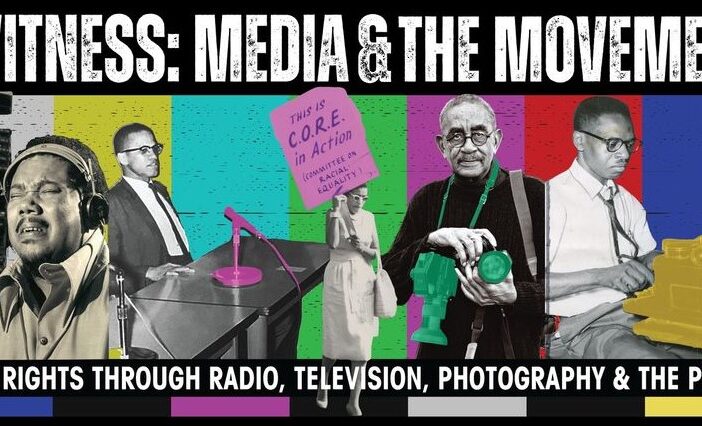The Reginald F. Lewis Museum’s latest exhibit, “iWitness: Media and the Movement,” casts a spotlight on how members of Black Press helped along the Civil Rights Movement. (Courtesy photo)
By Ariyana Griffin
Special to the AFRO
The Reginald F. Lewis Museum of African American History and Culture has unveiled a new exhibit, titled “iWitness: Media and the Movement.”
The exhibit comes during the 60th anniversary of the Civil Rights Act of 1964 and commemorates the Maryland activists, community leaders and organizations that shaped the Civil Rights Movement via radio, television, photography and as members of the Black Press.
Sign up for our Daily eBlast to get coverage on Black communities from the media company who has been doing it right for over 130 years.
“We thought it would be very befitting to have an exhibit that becomes something that commemorates the 60th anniversary to the passing of the Civil Rights Act. This [exhibit]is inspired by that act, and it is the lens through which we examine the impact of media on the Modern American Civil Rights Movement,” said Robert Parker, the museum’s chief curator and director of interpretation, collections and education.
Visitors are met with wall to wall pieces of archival history and photos of numerous sit-ins, protests and other historic events from the Civil Rights Movement which were documented by the Black Press.
Various figures, such as Thurgood Marshall, Dr. Lillie May Carroll Jackson, Victorine Q. Adams, Walter P. Carter and Kelson “Chop-Chop” Fisher are highlighted for their significant roles in the progression of the movement. Each figure has a photo next to their individual section explaining their hand in history.
]]>
“Pauli Murray and Thurgood Marshall, and of course Gloria Richardson, Robert Houston–these individuals are all Maryland natives whose legacies are still something we study, lift up and welcome,” said Parker.
The museum offered a free community day on Saturday, Aug. 10 for attendees to browse the new offering and the other permanent exhibits in the museum.
“I came to see the new exhibit, ‘iWitness: Media and the Movement,’ [because]the museum holds something integral to today’s society. Everyone should come down and visit it,” said Karen Brown.
Bridgette Bullock told the AFRO she was interested in seeing the Black history preserved on record by the Black Press.
]]>
“Most of our history [was]erased,” she said. “If we didn’t record it ourselves and prove that we were there, that we created these things– or it was a part of our movement–then it would never be in our history.”
“We continue to record our own history for our children and grandchildren to see that we actually documented our own history,” said Bullock.
The exhibit shines a light on important dates and events in Maryland history, such as the desegregation of the Gwynn Oak Amusement Park in Baltimore. The park, which featured a prized carousel, was officially desegregated on the same day as the March on Washington, August 28, 1963.
“iWitness: Media and the Movement” also uplifts the work and sacrifice that students at HBCUs, specifically Morgan State University have done to fight for the progression of society. Throughout the exhibit, visitors will enjoy a plethora of materials from the archives of the AFRO-American Newspapers.
]]>
Several events will be linked to the exhibit throughout its duration on display at The Reginald F. Lewis Museum of African American History and Culture, Aug. 8, – Sept. 1, 2025. The museum is open Monday and Thursday through Saturday from 10 a.m. to 5 p.m. On Sunday, visitors are able to enjoy the museum’s offerings from 12 p.m. to 5 p.m.
The latest exhibit includes an interactive portion, where visitors are able to think about some of the ways media shapes society today. Attendees are also implored to use their voices to speak out about injustices on available platforms.
“We invite our visitors to sort of a call to action,” said Parker. “We have some reflective questions that we think are thought provoking and very contemporary–questions that have relevance [and]emotional connection to what’s going on right now today.”
Get your AFRO A CARD today!
Help us Continue to tell OUR Story and join the AFRO family as a member. Members will receive exclusive journalism, and directly support the future of the AFRO. You can choose from three membership plans below.


